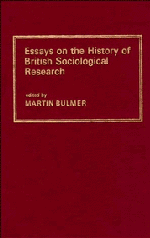Book contents
- Frontmatter
- Contents
- Preface
- Contributors
- Introduction
- History
- 2 Social monitors: population censuses as social surveys
- 3 The emergence of the sociological survey, 1887–1939
- 4 Durkheim, Booth and Yule: the non-diffusion of an intellectual innovation
- 5 The Government Social Survey
- 6 Methodological research on sample surveys: A review of developments in Britain
- 7 Mass-Observation 1937–1949
- 8 The Institute of Community Studies
- 9 Provincials and professionals: the British post-war sociologists
- 10 On the eve: a prospect in retrospect
- Use
- Index
3 - The emergence of the sociological survey, 1887–1939
Published online by Cambridge University Press: 12 November 2009
- Frontmatter
- Contents
- Preface
- Contributors
- Introduction
- History
- 2 Social monitors: population censuses as social surveys
- 3 The emergence of the sociological survey, 1887–1939
- 4 Durkheim, Booth and Yule: the non-diffusion of an intellectual innovation
- 5 The Government Social Survey
- 6 Methodological research on sample surveys: A review of developments in Britain
- 7 Mass-Observation 1937–1949
- 8 The Institute of Community Studies
- 9 Provincials and professionals: the British post-war sociologists
- 10 On the eve: a prospect in retrospect
- Use
- Index
Summary
This chapter focuses on a particular kind of social survey: the sociological survey. Such surveys go beyond exercises in social fact-gathering, and attempt to explain the major findings either by relating them one to another in ways that reveal causal connections between them, or by making reference to general features of society of which they may reasonably be claimed to be a product or to which they may be related. Those individuals who conducted sociological surveys in the period before 1939 were not for the most part, however, consciously trying to develop or to test sociological theory. Their motives lay elsewhere, but the end result of their endeavours was often the formulation of ideas and theories – usually in an implicit manner – whose significance went beyond the immediate findings.
The period chosen was one that saw the development of a conception of the sociological survey which was remarkable for its continuity, and yet which at the same time connected poorly, if at all, with the development of academic sociology in the universities. It begins with the surveys of Charles Booth, whose first findings were published in 1887 at a time when the Victorian boom years were coming to an end. The problem of poverty amongst the working classes was becoming more acute, but there were fierce arguments about its nature and extent. Booth was a liberal, a humanitarian and of Protestant faith, all of which served to put the individual at the centre of the stage.
- Type
- Chapter
- Information
- Essays on the History of British Sociological Research , pp. 52 - 69Publisher: Cambridge University PressPrint publication year: 1985
- 9
- Cited by



